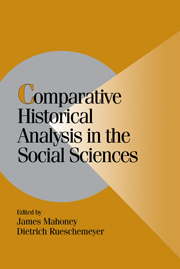Book contents
- Frontmatter
- Contents
- Contributors
- Preface
- Introduction
- I Accumulation of Research
- II Analytic Tools
- III Issues of Method
- 9 CAN ONE OR A FEW CASES YIELD THEORETICAL GAINS?
- 10 STRATEGIES OF CAUSAL ASSESSMENT IN COMPARATIVE HISTORICAL ANALYSIS
- 11 ALIGNING ONTOLOGY AND METHODOLOGY IN COMPARATIVE POLITICS
- Conclusion
- Index
- Cambridge Studies in Comparative Politics
- References
11 - ALIGNING ONTOLOGY AND METHODOLOGY IN COMPARATIVE POLITICS
Published online by Cambridge University Press: 05 June 2014
- Frontmatter
- Contents
- Contributors
- Preface
- Introduction
- I Accumulation of Research
- II Analytic Tools
- III Issues of Method
- 9 CAN ONE OR A FEW CASES YIELD THEORETICAL GAINS?
- 10 STRATEGIES OF CAUSAL ASSESSMENT IN COMPARATIVE HISTORICAL ANALYSIS
- 11 ALIGNING ONTOLOGY AND METHODOLOGY IN COMPARATIVE POLITICS
- Conclusion
- Index
- Cambridge Studies in Comparative Politics
- References
Summary
Some of the liveliest debates about methodology in the social sciences center on comparative research. This essay concentrates on comparative politics, a field often defined by reference to the use of a particular “comparative method,” but it also bears on sociology, where there is active controversy about methodological issues. I use the term “methodology” to refer to the means scholars employ to increase confidence that the inferences they make about the social and political world are valid. The most important of these are inferences about causal relationships, where the object of a methodology is to increase confidence in assertions that one variable or event (x) exerts a causal effect on another (y).
One of the curious features of contemporary debates is that they pay more attention to methodology than to issues of ontology. “Ontology” refers to the character of the world as it actually is. Accordingly, I use the term to refer to the fundamental assumptions scholars make about the nature of the social and political world and especially about the nature of causal relationships within that world. If a methodology consists of techniques for making observations about causal relations, an ontology consists of premises about the deep causal structures of the world from which analysis begins and without which theories about the social world would not make sense. At a fundamental level, it is how we imagine the social world to be.
- Type
- Chapter
- Information
- Comparative Historical Analysis in the Social Sciences , pp. 373 - 404Publisher: Cambridge University PressPrint publication year: 2003
References
- 249
- Cited by



